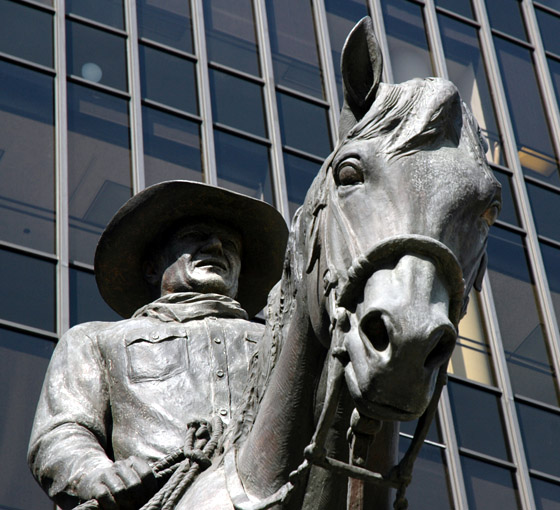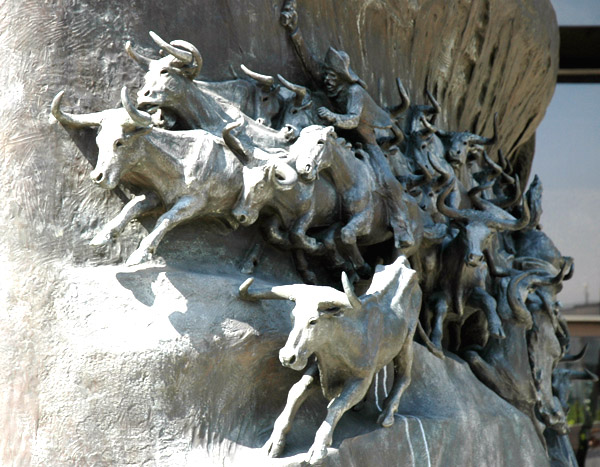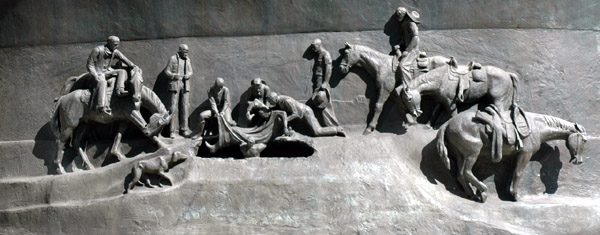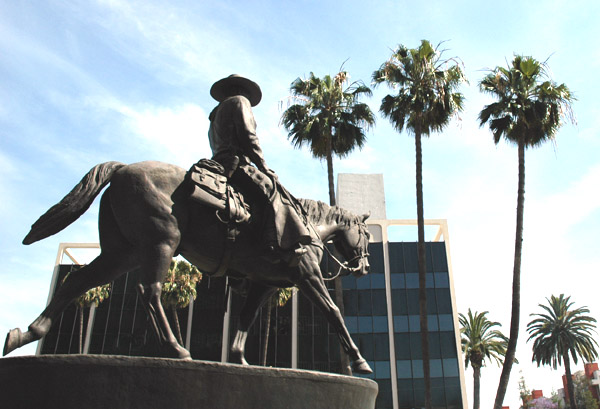Topic: The Media
Web Notes – Paying for What You Read
Web logs – blogs as they are know – seem to have become part of the national conversation. They are now covered on the cable news – on CNN and MSNBC these days for example. They may have played a part in bringing down Trent Lott and Dan Rather. They provide the political buzz, or a good part of it. For a list of those we consult regularly, to see what is being discussed as the hot topics of the day, see Sources for Political Commentary and News Before It Hits The Major Media - and I do need to add the ever useful Wonkette to that list of course. It’s all a matter of being plugged into the zeitgeist or whatever.
As said about web logs here fourteen months ago -
And that was long before the bloggers got on Dan Rather’s case.The folks who dig around these days are not with the mainstream press. It seems to be the investigative bloggers on the net who do the heavy lifting now. Some of us note things and try to stir the pot. But others actually do digging and keep looking deeply into things. Trent Lott would still be majority leader in the Senate had not he been hounded by web-heads finding this and that and posting his wacky (to be generous) comments. These same “diggers” kept pulling up stuff about Bush’s time in the Texas Air National Guard – odd items found and other odd items missing. There are more examples, but those will do to suggest something is afoot. In such cases the mainstream press eventually checked out what these independent sources had found and started reporting it, always graciously acknowledging who did the research, but not getting their own hands dirty with the digging through details.
But how does the mainstream press play in the conversation? Bloggers are always quoting comments from mainstream columnists, noting when issues rise to the Big Time, or whatever. For example, over at the leftie Daily Kos we find Markos Moulitsas Zuniga noting that Paul Krugman at the New York Times finally gets around to dealing with the "Downing Street memo" with the comment, "The Iraq Debacle has slipped from the country's consciousness. Good to see Krugman bringing it back into the conversation." He provides some quotes.
Many other web logs have similarly referenced Krugman’s column - as the Times provides confirmation that this is a big deal. And that business has been floating around the web logs, of course, for ten or eleven days – in these pages on May 8 you’d find The Smoking Gun You Have to Admire, one of so many comments.
But things are changing. It’s going to be harder to read and quote the Times, as it seems they want to severely restrict who reads them.
See this from MarketWatch -
That’s odd.12:48 pm 05/16/05
NYT.com to charge for Op-Ed, other content as of Sept - By Carolyn Pritchard
SAN FRANCISCO (MarketWatch) -- The New York Times Co. on Monday said that, starting in September, access to Op-Ed and certain of its top news columnists on the paper's NYTimes.com Web site will only be available through a fee of $49.95 a year. The service, known as TimesSelect, will also allow access to The Times's online archives, early access to select articles on the site, and other features. Home-delivery subscribers will automatically receive the service, the NYT said.
Oh, I'll probably put the New York Times on a credit card and not do the home delivery - no need for more paper around the house. But I may not. Most everything in the Times appears a day later and for free on the International Herald Tribune site. I suppose they may one day protect that site with a password too - to keep non-paying readers locked out.
Oddly enough, a week ago today the Los Angeles Times dropped the "subscription wall" that blocked access to their entertainment and industry content. Anyone who registers, for free, gets to see the stuff, and quote it and all that. They really want what they write to be seen and discussed, almost as if they want to be influential or something. Now the Wall Street Journal site has been behind a subscription wall for a few years now - 79.00 annually - and although that left-wing journalism professor at NYU, Eric Alterman, claims the Journal may be they best newspaper in America, but with the wackiest far right editorial page anywhere, no one quotes them much. They don't care. They get the money. The Atlantic used to be an influential magazine, but they went that route too with their web site. No one much reads them now, and no one quotes them, and folks don't write for them. And as Rick, The News Guy in Atlanta often points out, The New Yorker hides about eighty percent of its content from the net surfers, only opening up that which they know is hot, like the Seymour Hersch stuff.
It's a balancing act. The New York Times columnists, Krugman and Dowd and Herbert and the others who comment there are often quoted everywhere. The question for the Times? Do you really want that, or do you want the cash flowing in? You make your choices. In this case, better to reduce your audience than give away the product for free. Were I one of their hot-shit columnists I'd ask for a big raise to make up for being taken out of the national conversation.
One compromise is SALON.COM where you can get on for free if you first sit through a fancy daily advertisement. And they made money for the first time in six years last quarter, but not much.
The net is an odd place - lots of conversation and not much cash flowing around. Rick, The News Guy in Atlanta, suggest I just subscribe to the Times. I don’t think so. I think the New York Times has made a bad decision.
I suggested Rick set up his site - City-Directory Atlanta - so only those who have paid you eighty bucks a year can access any pages, and see what that does to his readership. Consider it an Atlanta-based marketing experiment, like that one from a few decades ago, the Atlanta-based marketing experiment called New Coke.
Still, I'd like to turn my sites, this and Just Above Sunset, into money-making ventures. I have discussed this with Rick in Atlanta, and with Ric Erickson, editor of MetropoleParis, and with a friend who teaches marketing to graduate students at a famous upstate New York business school.
It's a puzzle. Perhaps it cannot be done.
Maybe the Times is doing the right thing.
But some of us would rather they remain in the conversation, and we’re sorry to see them walk away.
__
Farhad Manjoo comments in SALON.COM -
We?ll see.You can't stand David Brooks but you read his column anyway, twice a week. Paul Krugman's anti-Bush rants ring so true for you that you ditch your work in the morning to e-mail them to your friends. Then there's Thomas Friedman, the world's favorite Middle East explainer; Bob Herbert, well-intentioned, if sometimes boring; and Maureen Dowd, indecipherable. Yet such is the power of the New York Times' Op-Ed page that even though some of its columnists may drive you into a rage that you can barely articulate, you still care deeply about what they have to say. So you read them all the time.
But will readers care about the Times' columnists if they've got to pay for the punditry? The paper is betting that they will. ...
Manjoo also cites the conservative Bush critic Andrew Sullivan - "The great gift that the New York Times gives the world is free access to its articles, opinion-journalists, and stories. But by sectioning off their op-ed columnists and best writers, they are cutting them off from the life-blood of today's political debate: the free blogosphere. Inevitably, fewer people will link to them; fewer will read them; their influence will wane faster than it has already. The blog is already becoming a rival to the dated op-ed column format as a means of communicating opinion journalism. My bet is that the NYT's retrogressive move will only fasten the decline of op-ed columnists' influence."
The free blogosphere? Whatever. And one assumes he means ?hasten? not ?fasten.?
And Manjoo contacts Markos Moulitsas Zuniga, of the Daily Kos mentioned above - "I think this is the best way they can become irrelevant. If my readers can't read it, why would I link to it? The key to blogging is that readers can look at the source material and make up their own minds." Moulitsas is a fan of Krugman's columns, but tells Manjoo that he would not personally pay for the subscription service. "I don't think it's worth fifty dollars. There's way too much content out there for me to pay for any of it."
Manjoo also cites Times columnist Frank Rich - "If you believe, as I do, that basically there is going to come a time when people are not going to read print newspapers anymore, someone has to figure out a way to get income for news gathering. Because who's going to pay for that bureau in Iraq? I think that every newspaper is feeling economic pressures, and so this is an attempt by the Times to exert some leadership, in some ways to stick a toe into this. It might solve some of the problems [declining print circulation, which afflicts generally all major newspapers in the country] without being draconian about it."
The need? Manjoo cites Arthur Sulzberger Jr., the Times Company chairman and publisher of the paper, reminding everyone that it costs a lot of money to produce the news - ?Damn it, just sending a reporter from the airport to Baghdad is expensive. It's measured in the thousands of dollars. And this war's only a small part of what we cover."
Well, producing the news costs money. No question. There is no ?free press? in that sense. Opinion and analysis blogs may be the only medium with almost no overhead. This has, in a sense, exempted them for the real world of worries about circulation and advertisers, and the real world of spending real dollars for on-the-scene reporting. It?s fantasy to think the world of real reporters and real commercial enterprise would play by the rules of the blog world.
So these two worlds may go their separate ways. That seems inevitable.
__
A aside on Newspapers:
Of course this, of unknown provenance, has been going around the net -
Yeah, well?1. The Wall Street Journal is read by the people who run the country.
2. The Washington Post is read by people who think they run the country.
3. The New York Times is read by people who think they should run the country and who are very good at crossword puzzles.
4. USA TODAY is read by people who think they ought to run the country but don't really understand The New York Times. They do, however, like their statistics shown in pie charts.
5. The Los Angeles Times is read by people who wouldn't mind running the country - if they could find the time - and if they didn't have to leave Southern California to do it.
6. The Boston Globe is read by people whose parents used to run the country and did a far superior job of it, thank you very much.
7. The New York Daily News is read by people who aren't too sure who's running the country and don't really care as long as they can get a seat on the train.
8. The New York Post is read by people who don't care who's running the country as long as they do something really scandalous, preferably while intoxicated.
9. The Miami Herald is read by people who are running another country but need the baseball scores.
10. The San Francisco Chronicle is read by people who aren't sure there is a country ... or that anyone is running it; but if so, they oppose all that they stand for. There are occasional exceptions if the leaders are handicapped minority feminist homosexual atheist dwarfs who also happen to be illegal aliens from any other country, provided, of course, that they are not Republicans.
11. The National Enquirer is read by people trapped in line at the grocery store.
12. None of these is read by the guy who is running the country.
Posted by Alan at 18:24 PDT
|
Post Comment |
Permalink
Updated: Tuesday, 17 May 2005 15:16 PDT
home











